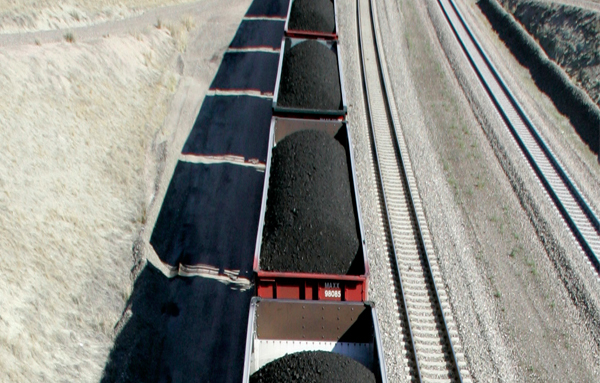Supporters and opponents of proposed coal export terminals in the Northwest made their case before the Rotary Club of Vancouver this month.
Speakers in the two-part series of presentations didn’t cover much new ground in the region-wide debate — both made familiar arguments for or against sending Asia-bound coal through the Northwest, mostly by train. But the presentations put a local spin on a conversation that’s so far mostly played out beyond Clark County.
A total of five proposed export terminals — two in Washington, three in Oregon — would process coal from the Powder River Basin in Wyoming and Montana on its way to energy-hungry Asian markets. Longview is one of the five sites currently under consideration for a new terminal. Plans for a sixth facility in Grays Harbor were dropped earlier this year.
The Rotary Club heard from two key players in the high-profile debate: Brett VandenHeuvel, executive director of advocacy group Columbia Riverkeeper, who argued against coal exports to Asia; and Tim Smith, a Seattle public affairs consultant for the pro-coal export Alliance for Northwest Jobs and Exports, VandenHeuvel largely cited environmental risks both locally and globally, and pointed to logistical problems that increased train traffic would bring to the region. A large portion of the trains carrying the coal would likely come through the Columbia River Gorge and Vancouver.
“We simply don’t have the capacity for that many coal trains,” VandenHeuvel said.
Estimates for just how many trains have varied widely. Some have put the number as high as 25 extra trains per day through Clark County. But in an interview with The Columbian earlier this year, BNSF Railway CEO Matthew Rose said eight to 12 extra coal trains is a more realistic estimate. Wherever the number lands, opponents worry that the additional rail traffic will cause congestion and access issues in the communities they pass through. That’s particularly problematic for some smaller cities with at-grade rail crossings, VandenHeuvel said.
VandenHeuvel also cited coal dust and pollution as major concerns of his and other groups. With climate change a growing problem, energy priorities should be moving away from coal, he said, not toward it.
“If we continue to burn more coal, it doesn’t matter where it’s burned,” VandenHeuvel said. “We’re going to feel the climate impacts here.”
On Wednesday, Smith weighed in on behalf of recently formed Alliance for Northwest Jobs and Exports, a group that has touted the economic benefits of coal exports. Smith, vice president of a Seattle-based PR firm, said the still-growing alliance formed in direct response to coal’s high-profile opponents who don’t alone represent the region’s collective voice.
“We thought at least we could try to balance the debate,” Smith said, noting the alliance now includes more than 40 business, labor and other organizations as members in support of coal exports.
The coal proposals now on the table are a huge opportunity for the Northwest, Smith said. Failing to take advantage of it would mean letting its economic benefits evaporate, he said.
Coal exports “would bring important jobs and revenue creation that is sorely needed,” Smith said.
A few Rotarians asked Smith to address the environmental and logistical concerns surrounding the facilities. He said those would be properly vetted during the review processes already under way in some cases. In Longview, for example, the state Department of Ecology, Cowlitz County and the U.S. Army Corps of Engineers have all agreed to conduct a full environmental impact statement on the proposed Millennium Bulk Terminals facility. That project could handle a total of 44 million tons of coal per year, according to the state ecology department.
One audience member questioned how much benefit Clark County would directly reap in exchange for the impact it would bear. Smith said he couldn’t answer that question at this point, but the opportunity is worth pursuing for the region as a whole.
If the proposed Northwest facilities don’t pan out, it likely won’t put a dent in global coal consumption, Smith said. Those operations — and the jobs they would bring — could land somewhere else, perhaps in Canada, even if the coal is shipped through Washington, he said.
“Not only do we have an opportunity here,” Smith said, “but we have an opportunity that we could easily miss.”
Eric Florip: 360-735-4541; http://twitter.com/col_enviro; eric.florip@columbian.com.




